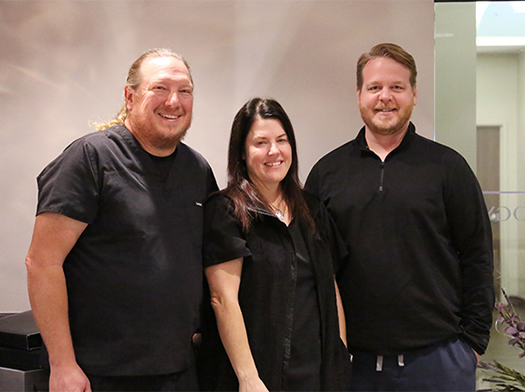Lora Katkic, at 38, had already gone through two C-sections, but the one she experienced in August at a Texas Health Resources hospital was "amazing."
"I cannot even describe to you the difference," Katkic said. "It blew my mind."
She was under the care of Cynthia English, D.O., an obstetrician-gynecologist on the medical staff at Texas Health Harris Methodist Hospital Southwest Fort Worth. With her colleagues, English uses a protocol that drastically reduces — or, in Katkic's case, all but eliminates — the use of opioids for pain in a C-section.

Only a tiny amount of fentanyl is included in the epidural block before the surgery, which involves cutting through the abdomen and uterus. The post-operative pain, which normally would be controlled with opioids, is managed with a long-lasting medication, liposomal bupivacaine, injected into the incision as the surgery ends, along with oral acetaminophen and ibuprofen.
Katkic said she left with son Austin Joseph Katkic after 36 hours but could have been discharged sooner. She said her previous stays were three or four days.
Large opioid reduction
OB-GYNs Taylor Bradley, D.O., and Timothy Jones, D.O., who are part of the same practice with English and who also are on the medical staff at Texas Health Southwest, use the same Enhanced Recovery After Surgery protocol. English said they've seen an average 70 percent reduction in opioid use for C-sections. Lengths of stay also are down overall.
"We are discharging people the day after surgery" in some cases, Bradley said.
Opioids, besides their well-known addictive qualities, can slow recovery after surgery. "It makes patients nauseous, their bowels aren't working, they aren't getting up as quickly," English said. "All of this increases length of stay."
English said it was previously typical to prescribe opioids every three hours after a C-section.
Patient education
Opioids still are available if a patient wants them, Bradley said.
"It starts with education in the office, letting patients know what's different about what we're going to do," he said. "We are not trying to take opiates away from their care plan. We don't discourage them at all. If they need something for breakthrough pain, that's fine."
But, English said, between the injectable medication and regular doses of oral acetaminophen and ibuprofen before and after surgery, "We're not playing catch-up with the pain."
The ERAS protocol has 26 elements, including oral acetaminophen and gabapentin. Post-op, the protocol calls for the same oral medications plus ketorolac (an anti-inflammatory) and other non-opioids, early walking and early removal of IVs and catheters.
Combatting opioid crisis
"This is yet another example of the innovative ways Texas Health is combatting the opioid crisis," said Glenn Hardesty, D.O., who is on the medical staff at Texas Health Presbyterian Hospital Plano and works as an emergency physician at Texas Health Prosper. Hardesty is co-chairman of Texas Health's Comprehensive Opioid Steering Committee.
"It's difficult if not impossible to predict people's responses to opioids, so we want to continue to decrease exposure," he said.
In 2017, the number of overdose deaths involving opioids was six times higher than in 1999, according to the U.S. Centers for Disease Control, which also says that on average, 130 Americans die every day from an opioid overdose.
Hardesty added, "Dr. English has been getting people up and out of the hospital quicker, and they're just able to experience motherhood differently — focus on the children and not be bogged down in this fog of pain and opioids."
Related News
About Texas Health Resources
Texas Health Resources is a faith-based, nonprofit health system that cares for more patients in North Texas than any other provider. With a service area that consists of 16 counties and more than 8 million people, the system is committed to providing quality, coordinated care through its Texas Health Physicians Group and 29 hospital locations under the banners of Texas Health Presbyterian, Texas Health Arlington Memorial, Texas Health Harris Methodist and Texas Health Huguley. Texas Health access points and services, ranging from acute-care hospitals and trauma centers to outpatient facilities and home health and preventive services, provide the full continuum of care for all stages of life. The system has more than 4,400 licensed hospital beds, 6,400 physicians with active staff privileges and nearly 29,000 employees. For more information about Texas Health, call 1-877-THR-WELL, or visit www.TexasHealth.org.
